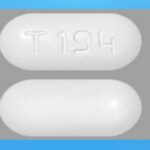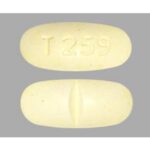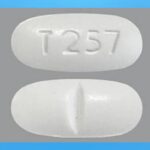M523 Pill: Uses, Dosage, Side Effects, Addiction

The white capsule-shaped pill that has the imprint 10/325 M523 has been identified as Acetaminophen and Oxycodone Hydrochloride 325 mg / 10 mg. Oxycodone and acetaminophen combination is used to relieve pain severe enough to require opioid treatment and when other pain medicines do not work well enough or cannot be tolerated.
Acetaminophen is used to relieve pain and reduce fever in patients. It does not become habit-forming when taken for a long time. But acetaminophen may cause other unwanted effects when taken in large doses, including liver damage. Oxycodone belongs to the group of medicines called narcotic analgesics (pain medicines). It acts on the central nervous system (CNS) to relieve pain.
When oxycodone is used for a long time, it may become habit-forming, causing mental or physical dependence. However, people who have continuing pain should not let the fear of dependence keep them from using narcotics to relieve their pain. Mental dependence (addiction) is not likely to occur when narcotics are used for this purpose. Physical dependence may lead to withdrawal side effects if treatment is stopped suddenly. However, severe withdrawal side effects can usually be prevented by gradually reducing the dose over a period of time before treatment is stopped completely. M523 pill is classified as Schedule II controlled substance.
Can M 523 pill cause any side effects?
Nausea, vomiting, constipation, lightheadedness, dizziness, or drowsiness may occur. Some of these side effects may decrease after you have been using this medication for a while. If any of these effects persist or worsen, tell your doctor or pharmacist promptly. To prevent constipation, eat dietary fiber, drink enough water, and exercise. You may also need to take a laxative. Ask your pharmacist which type of laxative is right for you.
To reduce the risk of dizziness and lightheadedness, get up slowly when rising from a sitting or lying position.
Remember that your doctor has prescribed this medication because he or she has judged that the benefit to you is greater than the risk of side effects. Many people using this medication do not have serious side effects.
M523 Pill Safety Information
Oxycodone
- Risk of addiction, abuse, and misuse, which can lead to overdose and death; assess patient’s risk before prescribing, and monitor regularly for development of these behaviors or conditions
- Serious, life-threatening, or fatal respiratory depression may occur
- Accidental consumption, especially in children, can result in fatal overdose
- Prolonged use during pregnancy can result in neonatal opioid withdrawal syndrome, which may be life-threatening if not recognized and treated
Acetaminophen
- Hepatotoxicity may occur with acetaminophen doses that exceed 4 g/day; take into account all acetaminophen-containing products the patient is taking, including PRN doses and OTC products
- Acetaminophen associated with cases of acute liver failure, at times resulting in liver transplantation or death
- New dosage limit allows no more than 325 mg/dosage unit for prescription medications that contain acetaminophen
- Healthcare professionals can direct patients to take 1 or 2 tablets, capsules, or other dosage units of a prescription product containing 325 mg of acetaminophen up to 6 times a day (12 dosage units) and still not exceed the maximum daily dose of acetaminophen of 4 g/day
Interaction with central nervous system (CNS) depressants
- Coadministration with benzodiazepines or other CNS depressants, including alcohol, may result in profound sedation, respiratory depression, coma, and death
- Reserve concomitant prescribing for use in patients for whom alternative treatment options are inadequate; limit dosages and durations to the minimum required; and follow patients for signs and symptoms of respiratory depression and sedation
- Instruct patients not to consume alcoholic beverages or use alcohol-containing drug products while taking morphine due to risk of additive sedation and respiratory depression.





